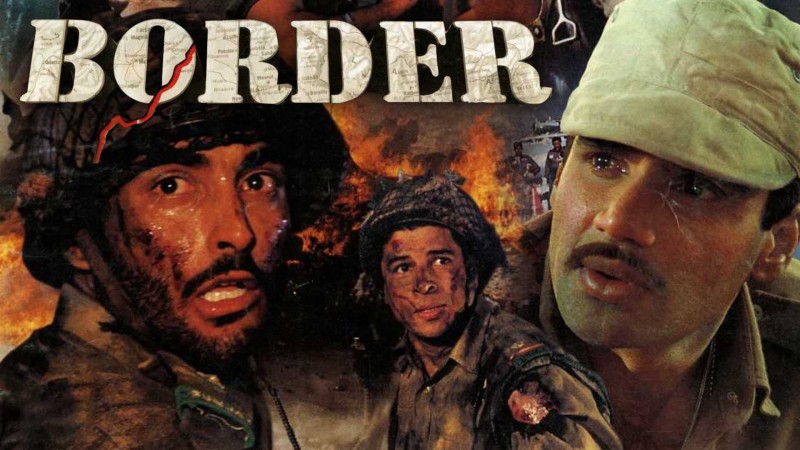
In the history of Indian cinema, the year 1997 marked a pivotal turning point. Bollywood saw numerous releases in a variety of genres during that year, but only one movie stood out both in India and internationally. J.P. Dutta's "Border," a work of art in filmmaking, not only became the highest-grossing Hindi movie of 1997 in India but also cemented its position as the second-highest-grossing movie globally, coming in second place only to the romantic hit "Dil To Pagal Hai." In this article, we examine the factors that contributed to "Border's" enormous success and enduring legacy.
In addition to being a movie, "Border" served as a tribute to the bravery and sacrifice of the soldiers who protected the country in the 1971 India-Pakistan war. J.P. Dutta, who is well known for his love of war dramas, drew his inspiration from actual people and incidents in order to create a story that rang with a strong sense of patriotism.
Several talented actors from the ensemble cast of the movie, including Sunny Deol, Suniel Shetty, Akshaye Khanna, Jackie Shroff, and others, were featured in the movie. In addition to being fictionalized versions of real-life soldiers who gave their lives in the Battle of Longewala, these actors also portrayed celluloid heroes. The actors all fit their parts perfectly, evoking real emotions and a sense of patriotism. This was a perfect example of casting.
When "Border" was released on June 13, 1997, the Indian public responded favorably right away. The terrifying events that the soldiers went through at the Battle of Longewala were depicted in the movie, as well as their unwavering bravery and tenacity in the face of difficulty. The story held the audience's attention, and they were able to empathize with the characters by sharing their fear, suffering, and, in the end, triumph.
The film's depiction of the war scenes was one of the elements that greatly influenced its success. The battle scenes were shot with an incredible level of attention to detail, making them both visually stunning and realistic. The commitment of the cast and crew to faithfully recreating the war zone and the use of practical effects paid off handsomely on the big screen. The viewers were left with a strong impression of these scenes that inspired pride and awe in the military.
A key factor in "Border's" success was the music, which was created by the renowned duo Anu Malik and featured poetic lyrics by Javed Akhtar. "Sandese Aate Hai" and "To Chalun," two of the movie's songs that resonated with audiences and captured the essence of longing and sacrifice. The soundtrack enhanced the emotional depth of the narrative and played a crucial role in the film's cultural legacy.
While "Border" ruled the Indian box office, it also gained popularity abroad. The movie's success cut across boundaries and drew viewers from far outside of the Indian diaspora. "Border" was a tale of bravery and resiliency in the face of adversity, not just one about India's bravery.
The movie's success abroad was more than just a lucky break; it was evidence of how popular its themes are around the world. The depiction of human emotions and the triumph of the human spirit struck a chord with viewers all over the world. This critical acclaim made "Border" the second-highest grossing movie worldwide in 1997, just behind the rom-com "Dil To Pagal Hai."
"Border" made a lasting impression on Indian cinema. It was a cultural phenomenon rather than just a box office hit. Indians were inspired by the movie to feel patriotic and proud of their country and the sacrifices made by their soldiers. Additionally, it opened the door for more war dramas in Bollywood, reviving interest in India's earlier wars.
For their performances, the "Border" cast was praised widely. Suniel Shetty's portrayal of Captain Bhairon Singh and Sunny Deol's portrayal of Major Kuldeep Singh Chandpuri were both notable performances. They set the bar for future actors playing similar roles with their performances, which were marked by unbridled commitment to their roles and unfiltered emotion.
Significant career effects of the movie were experienced by those involved. The actors received fresh acclaim for their performances, and J.P. Dutta's reputation as a war drama specialist was cemented. Additionally, "Border" sparked discussions about the sacrifices made by the armed forces and rekindled interest in war history among Indian audiences.
"Border" is more than just a movie; it is an example of how storytelling can evoke strong feelings, inspire patriotism, and cross international boundaries. Its popularity, both domestically and abroad, can be attributed to a variety of elements, including an engaging plot, standout performances, and catchy music. Additionally, it left a lasting legacy that encouraged subsequent generations to respect the sacrifices made by the Indian armed forces.
As we reflect on the year's cinema, "Border" stands out as a brilliant illustration of how a well-made movie can inspire and educate audiences in addition to entertaining them. It still has an influence on Indian cinema and holds a special place in the hearts of viewers everywhere, both in India and abroad. With its ability to cross boundaries and bring audiences together in a common celebration of bravery and patriotism, "Border" will always be remembered as a work of art in the cinema.
Anurag Kashyap and Saurabh Shukla, The Architectural Geniuses Behind 'Satya'
Yash Chopra's 'Lamhe' Release Story
Hera Pheri Controversy: Suneil Shetty's Edited Scenes and Akshay Kumar's Defense